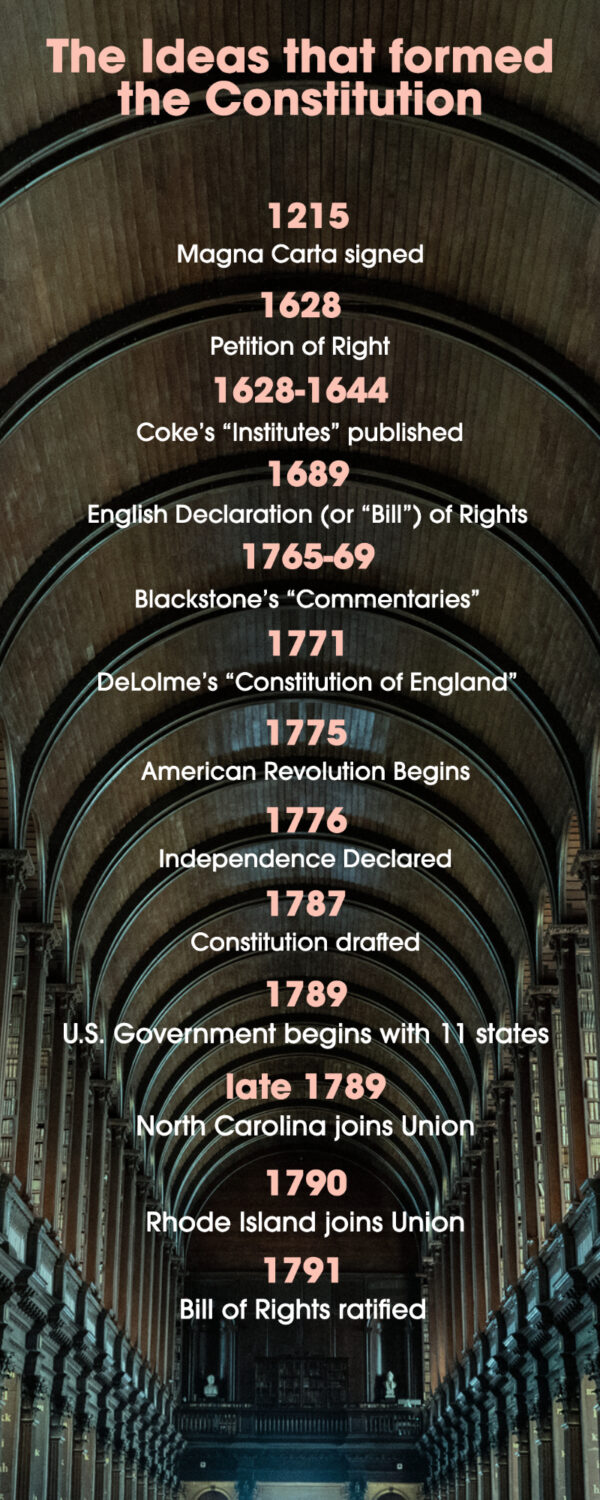


Commentary
This is the last in the series on “The Ideas That Formed the Constitution.” It applies the series’ lessons to how we educate our young.
The U.S. Constitution is America’s highest secular law—“the supreme Law of the Land” (Article VI). It structures the central government, regulates American federalism, and protects individual rights. Its study should, therefore, be a component of the education of every American citizen.
Indeed, for exercising American citizenship, knowing the Constitution is actually more important than studying, say, subsequent U.S. history. And it’s far more significant than many of the other subjects that consume time in public school classrooms.
Understanding the Constitution requires much more than discussing free speech or reading charts with titles like “How a Bill Becomes a Law.” The Constitution benefited from ideas extending back thousands of years. Most of the thinkers profiled in this series lived during classical antiquity. Those who came later, such as John Locke and Baron Montesquieu, themselves learned from classical wisdom—as well as from subsequent English and European history and from the principles of the Anglo-American legal system.
Finally, the framers who drafted the Constitution and the ratifiers who converted it into law were educated through curricula that centered on classical antiquity.
Early in my career as a teacher in institutions of higher education, I was taught a basic principle of pedagogy: “When planning a lesson—or a curriculum—begin at the end.”
This means you must start by defining what you want your students to know and be able to do. Once you establish your goal, you work back from there.
Thus, if a goal of American education is to produce good and knowledgeable citizens, then educators must teach students to understand the Constitution properly. And to understand the Constitution requires that students know the foundations upon which the document was constructed. That, in turn, requires significant attention to classical antiquity, as well as to later developments and ideas.
Let me be clear: I’m not suggesting we should simply replicate the education of the Founding Era. I don’t think an education centered on Latin-language classics is appropriate for most students—although it may be appropriate for many future leaders.
In view of what I’ve just stated, then all students, at some point before graduating high school, should:
I’m aware that many interest groups compete for school time, and that there are few expressions more common than, “This ought to be taught in school.” I submit, however, that few subjects now taught are more imperative to the survival of American independence and freedom than America’s basic law.
Canceling marginal subjects can make space available. Our public schools spend inordinate amounts of class time on issues of dubious long-term value, such as some of the social studies topics outlined here. Can anyone reasonably assert, for example, that studying “life and celebrations in Kenya” should displace studying the governmental system in which one lives and votes?
In the previous essay in this series, I alluded to the book titled “The Shame of American Legal Education,” authored by the Scottish scholar, the late Alan Watson. Part of the “Shame” is how the Constitution is mistaught in law school. You can get a hint of the deficiencies by reflecting on a common joke among law professors, “I don’t have my students read the Constitution; it only confuses them.”
I never thought that joke was funny. When I taught Constitutional Law, each class read the entire document aloud, with students taking turns until we got through all of it, with my interjecting observations and answering questions.
Producing lawyers, and therefore judges, who thoroughly understand our Supreme Law should be a top priority for all law schools. But reforming legal education will be even more difficult than reforming K-12 schooling.
This is true for several reasons: First, the degree of constitutional literacy appropriate for an attorney is higher than for the average citizen. Second, law professors tend to be poorly educated in history, classics, and language, and they cannot teach what they don’t know. Third, constitutional law professors usually have only minimal familiarity with major fields of law that influenced the Founders (such as real estate, contracts, agency, and trusts). Fourth, most of them either have not practiced law, or have not practiced for very long. Finally, the far-left tilt of legal academia creates positive incentives for disregarding, or even misrepresenting, the Constitution’s true meaning.
The immediate solutions aren’t perfect, but they will have to do. They rely on constitutional education by private, charter, and home schools, and in civic meetings and citizen classes, and in mass media outlets such as talk radio, podcasts, videos, and The Epoch Times. Those outlets will have to undertake the work that the public schools and law schools should be doing, but aren’t.
I have written the foregoing series as one contribution to this effort.
Read prior installments here: first, second, third, fourth, fifth, sixth, seventh, eighth, ninth, tenth, eleventh, twelfth, thirteenth, fourteenth, fifteenth, sixteenth, seventeenth, eighteenth, nineteenth, twentieth, and twenty-first.
Views expressed in this article are the opinions of the author and do not necessarily reflect the views of The Epoch Times.

